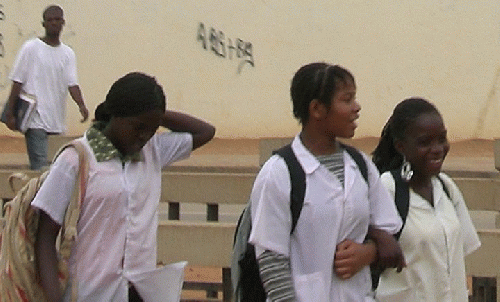
Teenage students walking to school in Luanda, Angola. According to the World Bank, the net enrollment rate in Angola in 2011 was of 86%.
(Image by Nadejda Marques) Details DMCA
There is no doubt that the eight Millennium Development Goals (MDGs) galvanized unprecedented efforts worldwide to reduce extreme poverty through education, health, development and equality. But as the UN, working with governments, civil society and other partners, prepares to set forth an ambitious post-2015 development agenda, it is important to revisit some of the recent debates on the future of education and education's impact on human rights.
Many of the MDGs contain significant references to human rights. However, in some aspects, and specifically with regard to education, the MDGs fail to embrace free primary education as an immediate obligation in international human rights treaties. This oversight prompted strong criticism from the United Nations High Commissioner for Human Rights in her 2008 report Claiming the Millennium Development Goals: A human rights approach. Education was included in the MDGs not only because it is valuable in and of itself, but also because there are many important benefits that flow from having received education. Thus, education: (1) improves productivity and the economic performance of individuals and societies; (2) acts as an inhibitor of poverty; (3) promotes well-being, including health; (4) reduces inequality; and (5) generates political agency that enables organization and mobilization of individuals and communities. However, until now, the MDGs have opted to focus on quantitative aspects and not necessarily on qualitative components of education. This political decision might have been motivated in part by the desire to ensure measurable outcomes to evaluate our progress. But the decision did not come at zero cost.
Governments in developing countries were keen on committing to short term policies in education that can be measured and ranked by international agencies rather than committing to long term policies that are not as easily quantified nor evaluated with the same rigor. This included an emphasis on primary education in detriment of secondary and higher education, not to mention early-childhood development programs. Research also shows that education outcomes are a result of more complex factors such as early childhood development programs and parental schooling and education. Since most developing countries lag behind in both of these areas, efforts to promote one or even two education levels (primary and secondary) are insufficient to produce the desired benefits. The result has been frustrated expectations.
Among economic, social and cultural rights, education has been granted a relative superior status in light of the multiplying effect it can promote in other areas such as health (more specifically, on infant mortality, maternal mortality, general sanitation and primary healthcare). However, the efforts devoted to expanding access to basic education in developing countries contradicts the principle that education can serve as means to achieve social capital advantage. There is a general lack of serious programs and policies to provide quality, high level education perpetuating or aggravating the cycle of poverty and the gulf between developed and poor nations.
As a result, the relative advances achieved in the past decade in terms of educational indicators are almost entirely dissociated from the advancement of other human rights. As is, the narrow scope by which education is being provided does not challenge the circumstances of gross violations of human rights. And, in schools and universities that once provided a safe and neutral arena for debate, increasingly, education has been offered and negotiated as just one more commodity, detached from fundamental principles such as freedom of expression and political and civil rights.
The narrow focus of the MDGs has not gone unnoticed. More broadly, organizations such as Trocaire explained that the MDGs framework tends to favor "simplistic solutions and top-down approaches which treat some of the symptoms -- but not the causes of poverty." In other words, there is more to education than enrollment, class hours, and testing. Similar arguments can be made about how traditional educational models have helped perpetuate social inequalities. For instance, for over a decade sociologist Jeanne Ballantine has demonstrated that schools have a social bias favoring advantaged students through tracking, leveling sanctions, sorting and selection. Inequalities in education respond to gender inequalities as well as disparities in content of education, teacher behavior, home environment and outcomes of the educational process. In addition, there are other mechanisms that serve the elites further increasing the gap between the rich and poor such as access to private schools and differentiated sets of social expectations.
These results are also apparent in quantitative terms: despite
significant achievements in enrollment in primary education (reaching up to 90 per cent in
developing regions), millions still have limited or no access to quality
education even at basic levels but almost certainly at middle and upper school
levels. According to the UNDP, high dropout
rates remain a considerable impediment to universal education. Even the
important achievements in global literacy and primary schooling have not
produced the desired outcomes of reduced poverty. As a result, gross disparities persist within
countries as well as between and among nations.
The acceptance of the importance of education has helped promote the debate on economic, social and cultural rights and contributed to shifting governmental initiatives to education. In Latin America, for example, social educational indicators and the international perception of education have gained considerable importance in the past decade. Significant debates about education and educational reforms seeking improvement have been implemented throughout the region and education has clearly gained political importance. However, the effects of these reforms, for the reasons outlined here, remain modest. Education for the future as well as the post-2015 development agenda is still part of an open debate.





